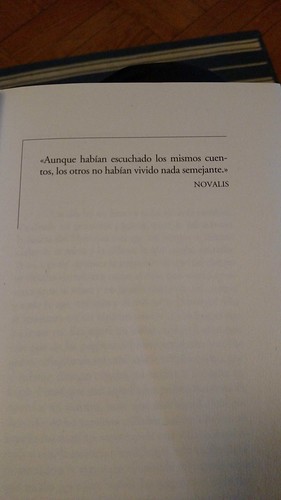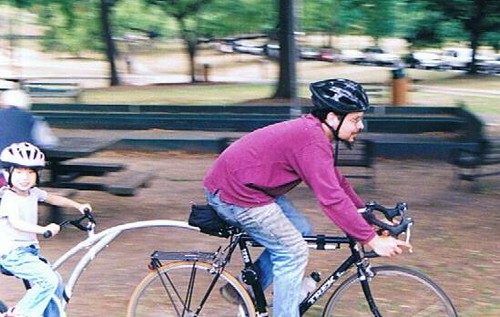|
|
Sunday, April 8th, 2018
Two difficult points in reading The New Life -- I am trying to identify with a narrator who is (a) running away to join a cult, or something with distinct parallels to a cult, and is (b) harrassing Janan, who has repeatedly told him to keep his hands off her.
posted afternoon of April 8th, 2018: Respond
➳ More posts about The New Life
|  |
|
I am now starting chapter 9 in my reread of The New Life-- if memory (aided by blog) serves, this is as far as I ever got the first time I read it. In the past month or two I've read the first eight chapters in Spanish and then in English. Going forward, I'll be reading each chapter in one language and then the other. (Not really trying to compare the two translations here, I'm just looking to (a) improve my Spanish and (b) get a deeper understanding of the text.)
It is tempting to try to imagine myself in the shoes of the narrator -- as I am reading the book, I'm trying to identify the book I'm reading with the unnamed book that the narrator is reading, so that it will take me to a new level of perception (as it does I, the narrator). But I-the-reader am having some trouble figuring out what's the allure of reading such a book, joining such a peculiar society as those-who-have-read-and-understood "the book", it seems more an onerous burden than a blessing. But as I say I'm only less than halfway through currently. Keep waiting for Pamuk to tip his hat! :) Osman and Janan are meeting Dr. Fine/Delicado, author (IIUC) of the book (not super crazy about either translation, I guess the man's name is a Turkish word with that meaning and it's going to be important somehow to understanding the text, to get that pun) -- maybe they're (we're) going to get access to the supernatural reality of the book (the book).
posted morning of April 8th, 2018: 3 responses
➳ More posts about Orhan Pamuk
|  |
Thursday, March 15th, 2018

Pamuk takes his epigraph to The New Life from the first chapter of Novalis's Heinrich von Ofterdingen -- the passage in full,
Wo eigentlich nur der Fremde herkam? Keiner von uns hat je einen ähnlichen Menschen gesehn; doch weiß ich nicht, warum nur ich von seinen Reden so ergriffen worden bin; die andern haben ja das nämliche gehört, und keinem ist so etwas begegnet.
posted evening of March 15th, 2018: Respond
➳ More posts about Readings
|  |
Monday, February 19th, 2018
Mehmet, Pamuk, Jelal, Galip, me?

posted morning of February 19th, 2018: Respond
➳ More posts about The Black Book
|  |
Saturday, February third, 2018
when it clicks: Orhan Pamuk is the author who taught me to identify with his narrator! (A lesson which has turned out to be really valuable in general as a way of reading.) This is exactly the story that he's telling about Galip's experience in The Black Book.
posted morning of February third, 2018: Respond
|  |
Monday, January 29th, 2018
...[A]ny Turk who passionately loves a masterpiece from the West which remains unread by his compatriots begins after a while to believe in all sincerity that not only does he love reading the book, but that he has written it himself.
--The Black Book
posted evening of January 29th, 2018: Respond
|  |
Sunday, January 28th, 2018
I decided to make a second try at reading Pamuk's The Black Book. I'm reading Güneli Gün's translation this time. (Thanks for the recommendation go to Badger of the lamented Orbis Quintus and also to Michael McGaha.) It's been a long enough time that I have forgotten the text and the story in all but the very broadest strokes, from time to time I am recognizing a passage. I ought to review my notes from last time. I remember finding it difficult to wade through, and am not having that experience now, which can probably be taken (broadly) as evidence in support of Gün's translation being a better one... I've started trying to read the chapters which are written by Jelal* as if I were in Galip's head, in the course of the story -- I think that is the intent, when for example the narrator says, Working in the taxi's top light, Galip marked Jelal's column all over with numbers, signs, and letters, but he still didn't get anywhere.
The idea is that the reader should carry this image and others like it into reading the next chapter, which will be a column of Jelal's (viz. "The Kiss"). Is this asking much of the reader? I don't think I noticed this pattern last time I read the book.Don't quite understand Galip's thinking that Jelal's columns (which he knows are reprints of old columns) would contain a clue abut Rüya's present whereabouts. (If I'm understanding right that that's why he's poring over the column and marking it up.)
In the middle of reading the previous Jelal column ("The Eye", which I think is one of the columns Galip had borrowed out of his cousin's collection of clips), I had the thought that the older relative (forget now which) who in a previous chapter criticized Jelal's columns as too long had a real point, that that could have been edited pretty brutally without losing much of value.
* Prefer this spelling, which Gün is using, to Celâl; Freely's rendering while accurate made me double-take "selal/jelal" every time I ran across it.
posted morning of January 28th, 2018: 1 response
|  |
Monday, September 25th, 2017
Flesh and bones, I wear you like an overcoat.
Flesh and bones, you carry me around
like a favorite toy.
posted morning of September 25th, 2017: Respond
➳ More posts about Poetry
|  |
Thursday, October 20th, 2016
A friend just now described a blister's shape as "a laconic Nike swoosh" -- and he was quite right, too, that's what it looked like. And I had indeed just had in mind that very image, without having been able to name it, and replied, "I had that exact thought except without the eloquence!" He: "I feel that way when I read books I like" and the scales fall from my eyes!
posted evening of October 20th, 2016: Respond
|  |
Sunday, August 4th, 2013
Speaking of Antonio, and thinking as always about identification with the narrator, I just want to note that Antonio's description, at the beginning of chapter 2, of his stay in the hospital reminds me very strongly of my own extended stay as a child after an auto accident -- the circumstances obviously quite different but the feeling of being kept in the bed not fully understanding what's going on around you is instantly recognizable.
I don't remember, however, the three days of surgery: they have disappeared completely, obliterated by the intermittent anesthesia. I don't remember the hallucinations, but I do remember that I had them; I don't remember having fallen out of bed due to the abrupt movements that one of them provoked, and, although I don't remember that they tied me down in the bed to prevent that from happening again, I do remember quite well the violent claustrophobia, the terrible awareness of my vulnerablility.
 (Incidentally: Is Antonio 42 or so at the time of writing? is a question I find intriguing.)
↻...done
posted afternoon of August 4th, 2013: Respond
➳ More posts about The Sound of Things Falling
| Previous posts about Identification
Archives  | |
|
Drop me a line! or, sign my Guestbook.
•
Check out Ellen's writing at Patch.com.
| |













